Catastrophe At 4 A.M.: Director Waad Al-Kateab’s ‘Death Without Mercy’ Recounts Horror Of 2023 Turkey-Syria Earthquake

The massive earthquake that struck Turkey and Syria in February 2023 produced catastrophic damage and loss of life – killing more than 55,000 thousand people and leveling huge swaths of cities.
Perhaps most devastating of all was the knowledge that the destruction didn’t need to be so extreme. Poor construction caused many buildings to implode, collapsing into clouds of dust. Inadequate rescue efforts left many who survived the initial quake and aftershocks to perish in the rubble.
More from Deadline
The new documentary Death Without Mercy, directed by Oscar-nominated Syrian filmmaker Waad Al-Kateab, captures what happened when tranquility was shattered at 4:17 a.m. local time on February 6, and the extraordinary scenes of destruction and suffering that followed in the hours and days afterwards. The film, from MTV Documentary Films, just premiered at Sheffield DocFest.
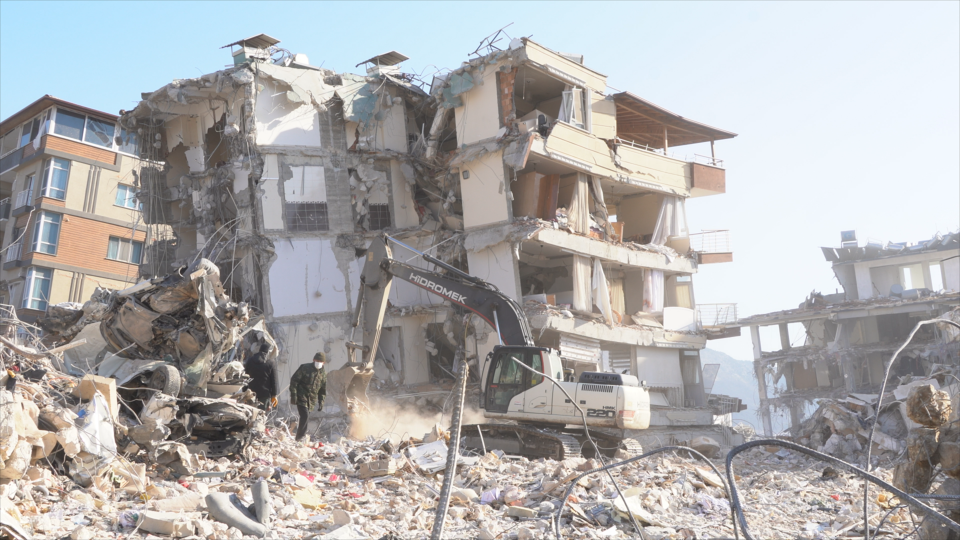
“At the beginning, we couldn’t really understand this scale of death,” says Al-Kateab. “In that time there was nothing we could do, but really try to do something with documenting.”
Al-Kateab heard the news in London, where she has been living for several years with her husband, Dr. Hamza Al-Kateab, and their two daughters. They were forced to flee Syria during the civil war, a story told in the 2019 documentary For Sama (directed by Al-Kateab and Edward Watts). She and her family visited her parents and her sister in Southern Turkey about a month before the disaster; millions of Syrians had taken refuge there as the war in their country destroyed city after city. But on February 6 more tragedy awaited.
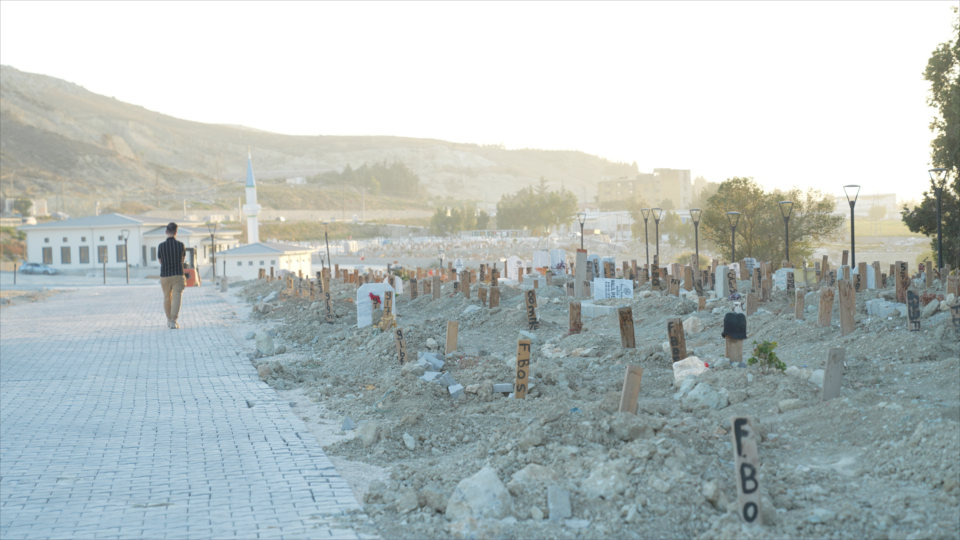
“It’s awful wherever [an earthquake] happens and no one ever should go through this,” Al-Kateab says. “But to be happening in that specific area and to have the destruction and the death in Turkey, even more than Syria — all of these people who have been through everything. They just found safety [in Turkey] or they were still next to the borders because they want to go back and they had just started a new life, very simple… It doesn’t make sense in any way. Why and how.”
After the earthquake, Al-Kateab was able to establish contact with friends Fadi al-Halabi – main cinematographer of Oscar-winning short documentary The White Helmets — and Fuad, who had been away from their families in Southern Turkey when the quake struck.
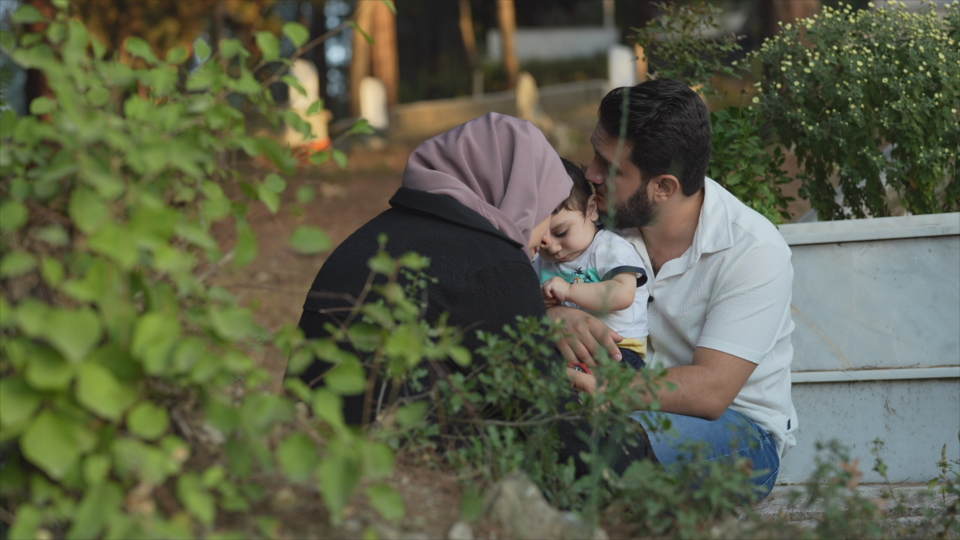
“I called Fuad directly, I called Fadi directly. I know their families in this area,” Al-Kateab notes. “At that time, I was watching what Fuad was filming on his phone on Instagram… I know Hassan [Kattan], who is my producer on this film as well. He was there with him. Every time I was calling them, I was like, please film, please document. I know you’re not in this mood now, but [it will be important].”
Death Without Mercy includes their footage, other first-hand video shot by survivors, CCTV video of the quake and aftershocks, and drone footage showing the immensity of the damage. Al-Kateab and her husband Hamza, who worked as a physician in a hospital in Aleppo, had seen their city reduced to ruins by the forces of Syrian dictator Bashar al-Assad, yet the earthquake produced imagery that was somehow harder to absorb.
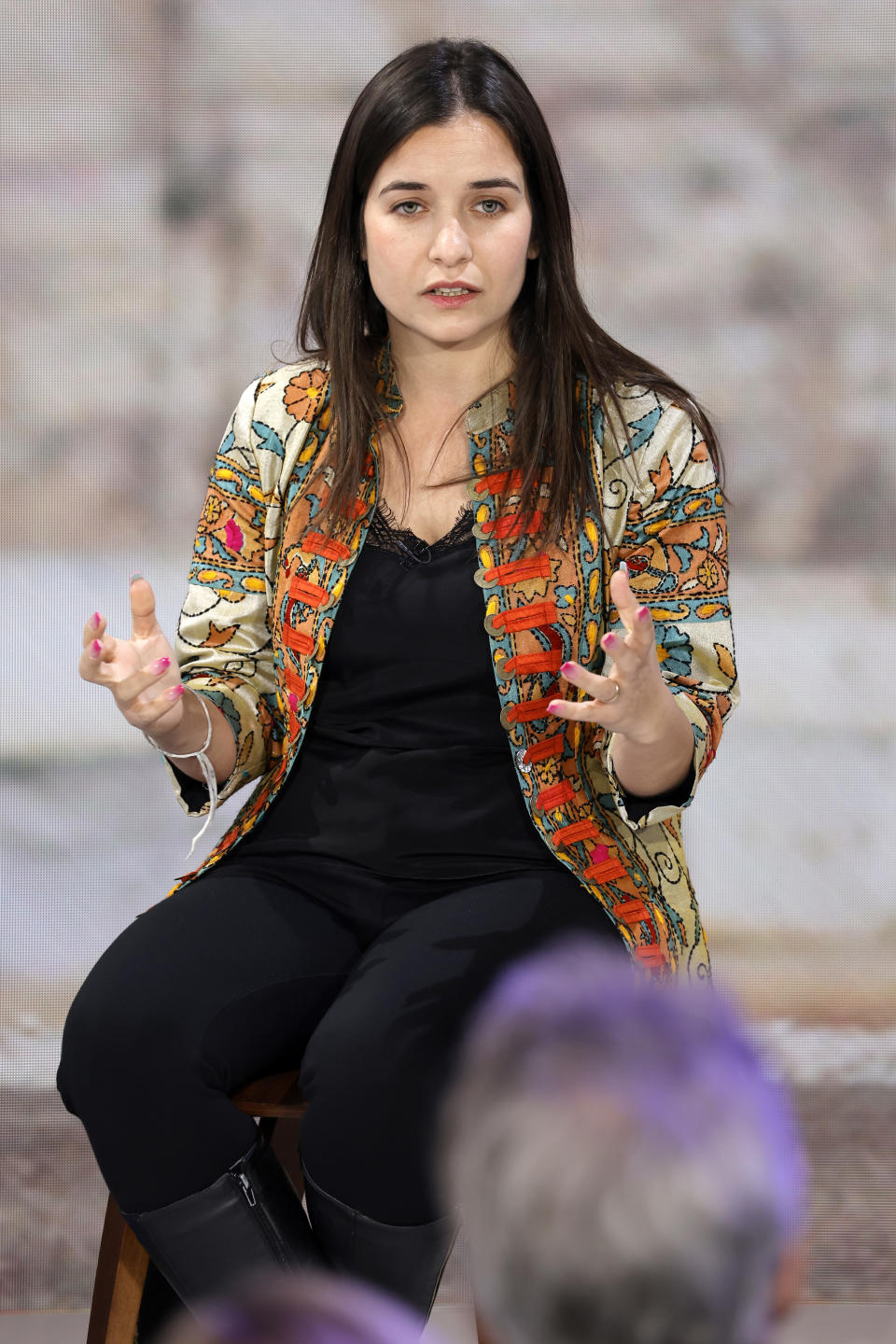
“I’ve been through all this shelling and bombing, but the scene there was unbelievable,” she notes. “In one moment, we saw how the city [Antakya, Turkey] turned into something like five years of war in Aleppo. It was just so shocking.”
Rescuers tried as best they could to pull debris off survivors. A few were plucked to safety. Others trapped in collapsed buildings could be heard pleading for help, but they were doomed by an uncoordinated government response and a lack of heavy equipment to move piles of concrete slabs.
“The UN did not react well, the Turkish government did not react well,” Al-Kateab says. “People with [missing] loved ones, they were not treated with dignity. It was just awful.”
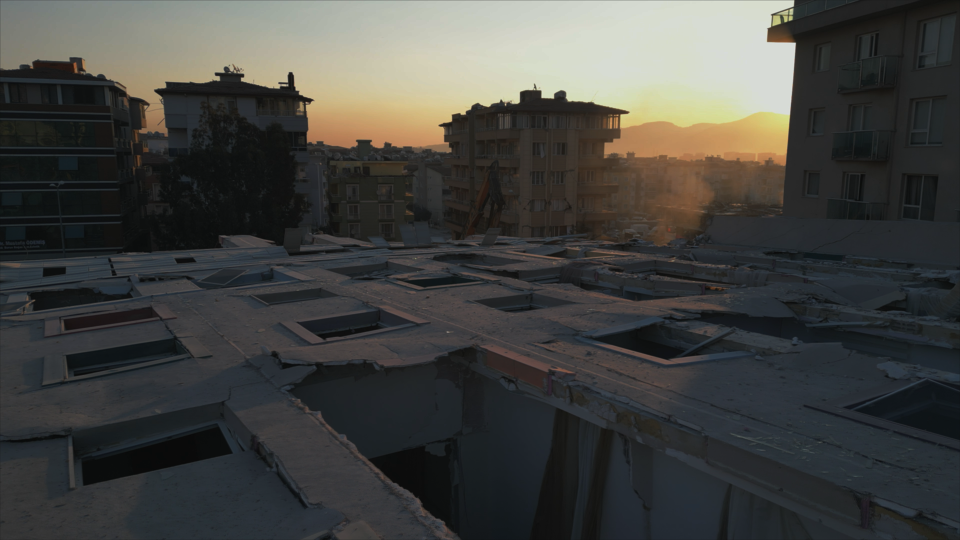
One luxury high rise fell on its back, killing hundreds of people. It did not take long to realize that many buildings that collapsed had been improperly constructed. In the film, survivors examine clay soil atop which some structures had been erected; the buildings were not attached to bedrock and the quake of 7.8 magnitude (and an aftershock of nearly the same power) shook them apart in seconds.
Investigations would show that widespread zoning violations had occurred; for example, 10 additional stories added to a building permitted to go no higher than two or three.
“It’s been a systematic kind of failure and corruption over the years, which also we tried to shed light on in the film,” Al-Kateab says. “It’s not like a mistake — a full system of corruption and irresponsibility.”
Death Without Mercy shows a TV ad that aired in Turkey sometime before the quake that cheerfully told people they could get an amnesty for their improperly built or zoned structures if they came forward. “In the ad the government is calling for contractors and people to go register their wrong building codes and pay a fine without really correcting them,” Al-Kateab explains. “If they come and register, it’s okay.”
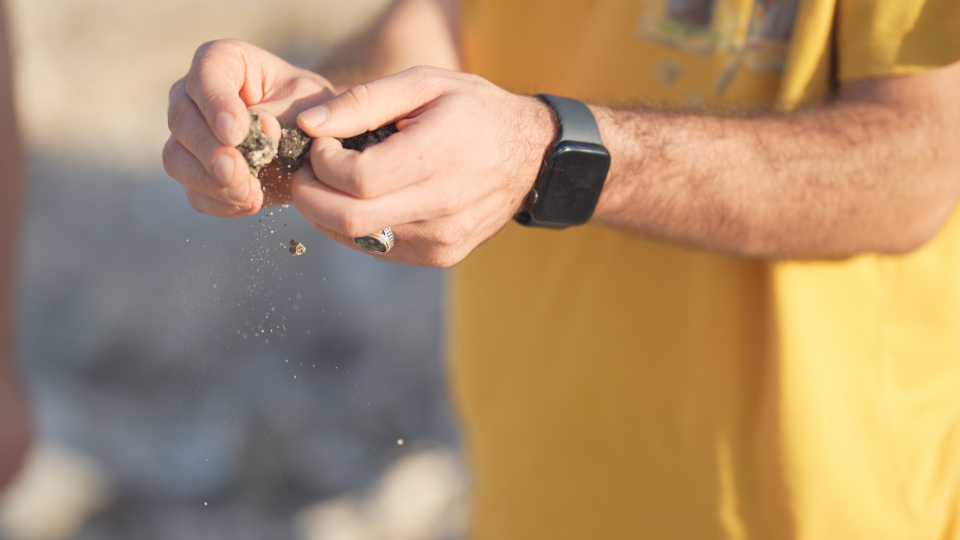
Can there ever be full accountability for such a staggering loss of life? What would accountability look like?
“There’s a lawyer in the film who says something about they can rebuild and they can give people compensation for this… But will this bring the people back? Will this make the pain that everyone went through disappear?” Al-Kateab asks. “I don’t think there’s anything really that will equal justice. That doesn’t mean we should not keep fighting and trying to bring these people [to] accountability… But even for Fuad and Fadi — Fadi lost all his family, 13 members of his family. What on earth could happen for him to feel okay? There’s no way. But at least we can maybe reduce a little bit of this pain if he knows that the people who are responsible for this, they are under accountability — and not just the builders or the people who really worked on [construction]. It’s the whole system, it’s the whole government. Everyone is responsible.”
By and large, people in the West paid little attention to the quake. Death Without Mercy, which will begin streaming on Paramount+ later this year, brings home the reality of what happened for viewers who either never realized or simply forgot.
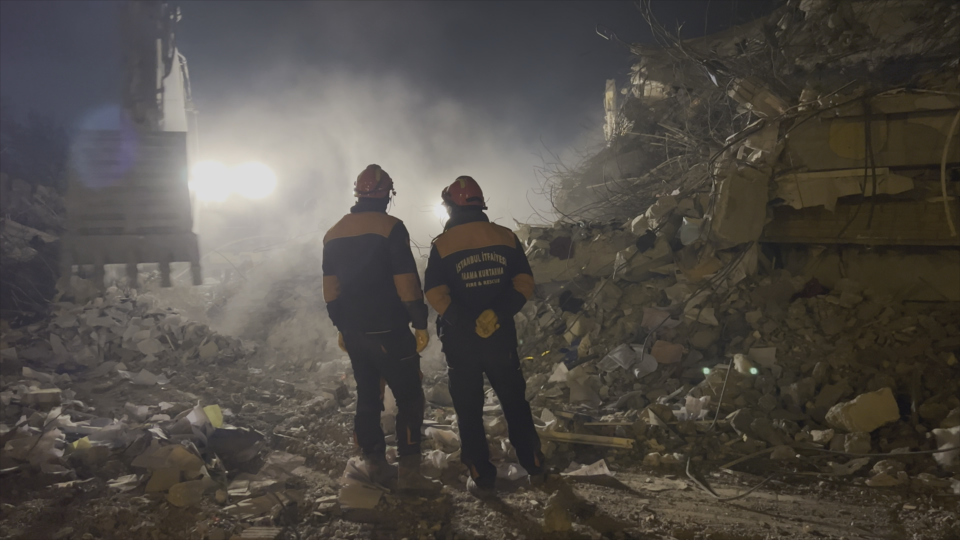
“The world moved on,” Al-Kateab says, adding that those affected by the disaster cannot forget, even if they might hope to. “Even me, I didn’t lose anyone in the earthquake, but I know these people, they mean a lot to me, and they could be my parents who were there or my sister. So we don’t want to move on. We want people to come and sit down and relive this and understand this and try to do something for the rest of these people.”
A there is the strong possibility that another disaster could happen. “The conversation of the earthquake in Turkey, specifically, it’s not finished,” Al-Kateab insists. “They’re talking about [the potential for] a much bigger one in Istanbul, where Fuad lives now, for example, because he can’t go be back to Antakya. So, it’s not something that happened and we have to move on and find our new life. This could happen again. There could be another disaster around the world. It is our responsibility whether we like it or not. We all have to do something about this.”
Best of Deadline
2024-25 Awards Season Calendar - Dates For Oscars, Emmys, Grammys, Guilds & More
Berlin Film Festival 2024: Award Ceremony, Film Premieres & Red Carpet Gallery
Sundance Film Festival 2024 Photos: Award Ceremony, Film Premieres & Parties Gallery
Sign up for Deadline's Newsletter. For the latest news, follow us on Facebook, Twitter, and Instagram.


